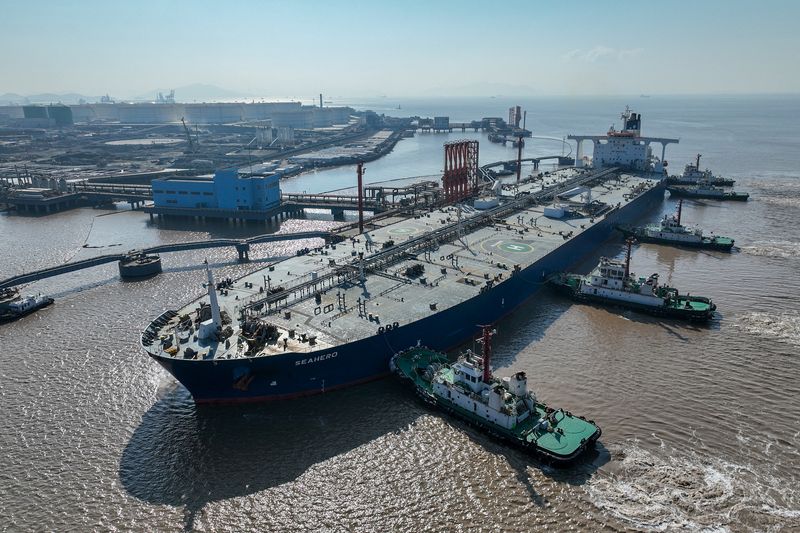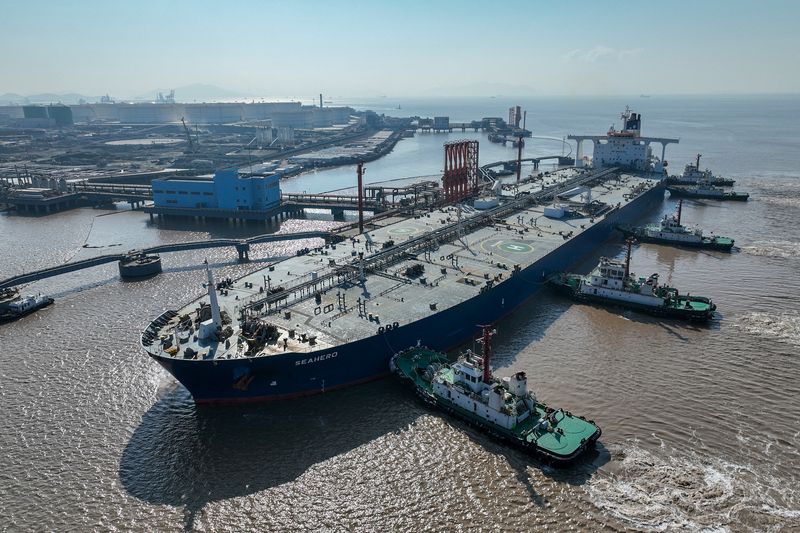
By Georgina McCartney
HOUSTON (Reuters) -Oil prices dropped on Friday by more than $2 as investors reacted to renewed hopes of a ceasefire in Gaza, while a strengthened dollar further pressured the market.
Brent crude prices were down $2.26, or 2.66%, to $82.85 a barrel by 01:35 p.m. EDT. U.S. West Texas Intermediate crude futures dropped $2.50, or 3.02%, to $80.32.
U.S. Secretary of State Antony Blinken said on Friday a long-sought ceasefire between Israel and the Palestinian militant group Hamas was within sight.
“I believe we’re inside the 10-yard line and driving toward the goal line in getting an agreement that would produce a ceasefire, get the hostages home and put us on a better track to trying to build lasting peace and stability,” Blinken said.
The war in Gaza has led investors to price in a risk premium when trading oil, as tensions pose a threat to global supplies.
If a ceasefire is reached, the Iran-backed Houthi rebels could ease their attacks of commercial vessels in the Red Sea, since the group declared the attacks in support of the Palestinian militant group Hamas in its fight against Israel.
“Geopolitics is starting to ease just a little to bit so that ought to work in our favor, following the news of this ceasefire,” said Tim Snyder, chief economist at Matador Economics.
Further, in its strongest findings to date on the Israel-Palestinian conflict the United Nations’ highest court said on Friday that Israel’s occupation of Palestinian territories and settlements there are illegal and should be withdrawn as soon as possible, further buoying hopes of an end to the conflict.
The U.S. dollar index climbed after stronger-than-expected data on the U.S. labor market and manufacturing earlier in the week, pressuring oil prices, said Phil Flynn, an analyst at Price Futures Group.
A stronger U.S. currency dampens demand for dollar-denominated oil from buyers holding other currencies.
Elsewhere, Chinese officials acknowledged on Friday the sweeping list of economic goals re-emphasised at the end of a key Communist Party meeting this week contained “many complex contradictions”, pointing to a bumpy road ahead for policy implementation.
China’s economy grew by a slower-than-expected 4.7% in the second quarter, official data showed, sparking concerns over its demand for oil.
A global tech outage on Friday disrupted operations in multiple industries, with airlines halting flights, some broadcasters going off the air and everything from banking to healthcare hit by system problems.

Meanwhile, two large oil tankers were on fire after colliding in waters near Singapore.
Singapore is Asia’s biggest oil trading hub and the world’s largest bunkering port. Its surrounding waters are vital trade waterways between Asia and Europe and the Middle East and among the busiest global sea lanes.
This post is originally published on INVESTING.




